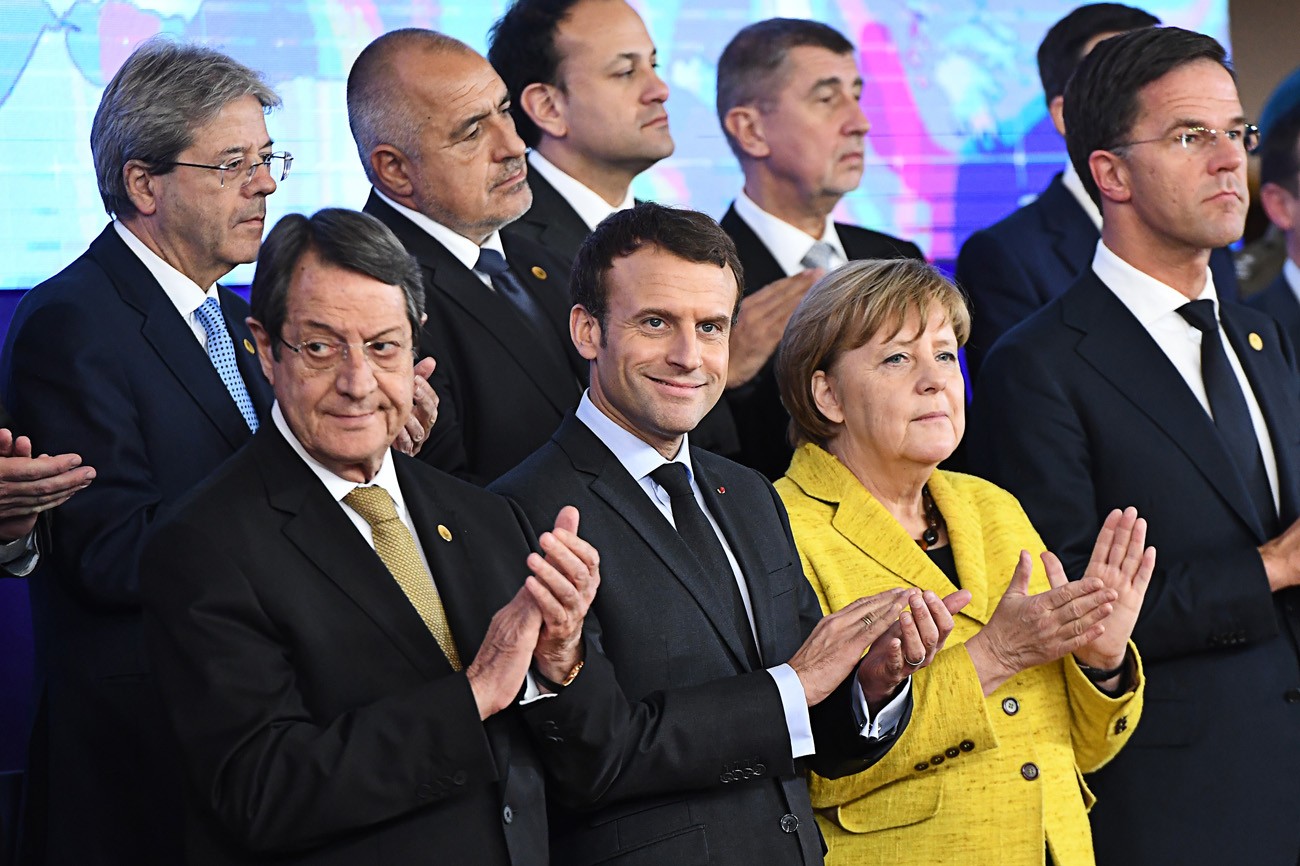EU launches defence pact it calls 'bad news for enemies'
Change Size
 Germany's Chancellor Angela Merkel (second right), France's President Emmanuel Macron (second left), Netherland's Prime minister Mark Rutte (right) and Cyprus' President Nicos Anastasiades (first left) attend a ceremony on the Permanent Structure Cooperation (PESCO) on the margin of the first day of a European union summit in Brussels on Dec.14. European leaders will discuss the migration crisis and defence on December 14, followed by Brexit the day after.
(AFP/Emmanuel Dunand)
Germany's Chancellor Angela Merkel (second right), France's President Emmanuel Macron (second left), Netherland's Prime minister Mark Rutte (right) and Cyprus' President Nicos Anastasiades (first left) attend a ceremony on the Permanent Structure Cooperation (PESCO) on the margin of the first day of a European union summit in Brussels on Dec.14. European leaders will discuss the migration crisis and defence on December 14, followed by Brexit the day after.
(AFP/Emmanuel Dunand)
F
lanked by soldiers in combat dress, European leaders inaugurated on Thursday a landmark defence cooperation pact that EU President Donald Tusk said was "bad news for our enemies".
Twenty-five countries -- all of the EU member states except Denmark, Malta and Britain, which is leaving the bloc -- are joining the so-called permanent structured cooperation on defence, or PESCO.
It aims to get EU states to work more closely and spend money more effectively on defence projects, including the development of new weapons.
After half a century of frustrated efforts to integrate European defence capabilities, Russia's annexation of Crimea in 2014 and claims of state-sponsored cyberattacks gave the idea fresh impetus.
"For many years the strongest argument against PESCO had been the fear that it would lead to the weakening of NATO," Tusk said at the launch at a summit in Brussels.
"But it is quite the opposite -- strong European defence naturally strengthens NATO," he said.
"This is why PESCO is not only good news for us, but it is also good news for our allies and bad news for our enemies."
- Independence from US -
The EU's diplomatic chief Federica Mogherini, who helped bring the French- and German-backed plan to fruition, hailed the agreement as a "historic decision that turns the EU into a credible security provider globally".
A host of policy differences with Washington and US President Donald Trump's repeated complaints about Europe not spending enough on its own defence spurred EU leaders to move quickly.
Fears have grown that the US would not honor its longstanding commitment to come to Europe's aid, and European Commission chief Jean-Claude Juncker has said the bloc "cannot and should not outsource our security and defence".
"We see that around the world there is a strong need for the EU to be active as a point of reference, as a player, as others are taking different directions," Mogherini said Thursday in an apparent swipe at Trump's "America first" approach.
But a question mark hangs over the funding for PESCO, with the 1.5 billion euro a year European Defence Fund still awaiting final approval.
Mogherini said she would press EU leaders to include funding for defence in the bloc's budget "so that this Europe of security and defence is financed at an adequate level".
A first batch of 17 projects includes a Belgian-led effort to develop submarine drones to tackle mines at sea.
Other proposals include a German-led "crisis response operation core" aimed at speeding up the deployment of troops to emergency situations, though initially this will begin with a low-key implementation study.
Past efforts to integrate EU defence have been frustrated -- first by French reluctance and later by fierce British opposition to anything resembling a "European army".
- NATO backing -
The initiative has the backing of NATO, in part because it requires countries to increase their spending on defence, a priority for the US-led alliance.
"I welcome the initiative to strengthen European defence because I believe that will be good for the European Union, for Europe and for NATO," the alliance's chief, Jens Stoltenberg, said.
But he warned that PESCO projects must work in harmony with NATO.
"We cannot risk ending up with conflicting requirements from EU and from NATO to the same nations," Stoltenberg said as he arrived at the summit.
And with one eye on Brexit, he cautioned that non-EU allies must be as fully involved in PESCO as possible.
When Britain quits the bloc in 2019, 80 percent of NATO's defence expenditure will come from non-EU states, he said, highlighting the importance of cooperation rather than competition.
Under PESCO statutes, as a non-EU state Britain will be able to take part in specific missions but will have no decision-making role. (**)









